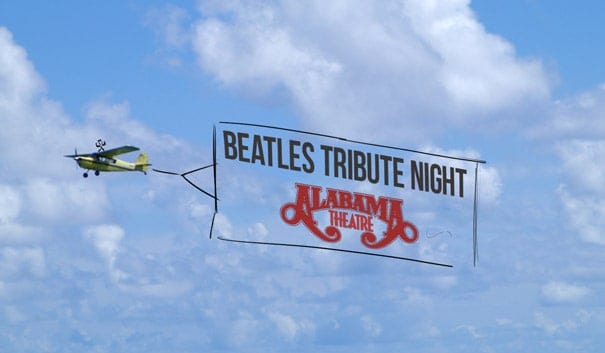
By Drew Hudgins | Subscribe on YouTube
ad strategy
The one question this well-known brand forgot to ask
(That you're not likely asking either)
Advertising is expensive. No surprise. And it ain’t cheap to rent a plane to fly a magnetic offer over a crowded beach.
Today, we’ll compare two brands: how one could say so much in THREE words, while the other missed some serious opportunity.
[social_warfare]
Today's message? Alllllll lesson.
No survey or favor… Just a solid parable.
And if you’re running ANY sort of ads! … ANYthing—Fakebook, MySpace, your town’s high school year book… wherever—listen up ’cause, like 1% of people seem to be asking this one question …
(the other 99 are split between Netflix bingeing and questioning sensational statistics)
Story time.
Sand.
It’s on the beach.
And in my home. How?
….. from 692 miles away, sand finds its way into my home.
8th Wonder of the World? Indeed. It is.
Couple o’ weeks ago, I was at the beach—and noticed 2 things: Sand…
…and flying banner ads.
Lots of them.
This one ad stuck out.
I didn’t take a picture (remember? sand) so I sketched something out..

Whatdyathink?
Good? Bad?
………..
Not good.
Maybe I’m wrong here. Maybe Ripley’s ran the numbers and could tell us this ad brought in a gajillion clams that afternoon. Who am I to say? I’ll wait for their call.
But let’s compare it to another.
Maybe I’m wrong here. Maybe Ripley’s ran the numbers and could tell us this ad brought in a gajillion clams that afternoon. Who am I to say? I’ll wait for their call.
But let’s compare it to another.
[another masterpiece re-enactment sketch]

Best ad in the world?
Who knows?
But here’s one question that anyone can ask themselves, to come up with stronger messages.
“How much are they expected to already know?
Let’s take the Beatles ad: The only thing those beach goers are expected to know…
That the Beatles are a band
With those three words AND context, they can put the rest together:
- Live music. Check.
- When? (tonight) Check.
- Where? Oh, the huge signs every tourist has seen a dozen times. Got it. Check.
In front of tons of people who grew up listenin’ to all that ruckus?
And now those people have timeshares… and are treating their families to vacations?… and are open to dinner ideas for that night?
Three simple words. And they nailed it.
[clickToTweet tweet=”In front of tons of people who grew up listenin’ to all that ruckus? And now those people have timeshares… and treating their families to vacations?… and are open to dinner ideas for that night? 3 simple words. And they nailed it.” quote=”3 simple words. And they nailed it” theme=”style5″]
The Ripley’s ad? People would be expected to…
- To be familiar with the logo
- And to know what Ripley's is (Museum of Oddities? Aquarium? Restaurant?)
- To know about how much whatever you're getting is going to cost (without that, there's no mental anchor — which gives the $5 offer ZERO relevance)
- To be curious and motivated enough to visit the website (remember that offer? You really think it's strong enough to get even that small of an action?)
What else is working against them?
- Ripley's decided their logo would say everything (I guess).
- So they gave up some serious banner real estate that could have told us SOMEthing more!
- And is there any "fine print" you don't know about? (More research? On vacation? ... Ya lost me.)
Kudos to both brands for advertising with that format… in front of:
- out-of-towners who are there to make great experiences,
- and are looking for stuff to do
- and need to eat food.
At the end of the day, hungry, bored, sunburnt, live-music fans were going to be packing the Alabama Theater.
And maybe a thrifty handful of others stretched their budget five more bucks.
Your turn.
Maybe you’re flying a great ad over the wrong beach.
I’m being metaphorical. (I don’t think most readers will be on the beach).
But what was a time when you either rocked it or discovered your offer was flying in front of the not-so-optimal faces?